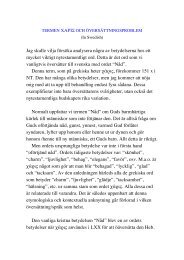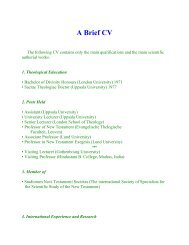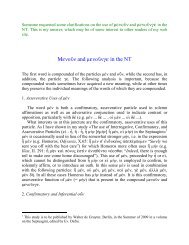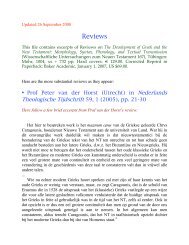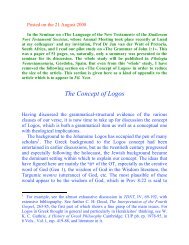“Greek. A Language in Evolution” copy - Chrys-caragounis.com
“Greek. A Language in Evolution” copy - Chrys-caragounis.com
“Greek. A Language in Evolution” copy - Chrys-caragounis.com
Create successful ePaper yourself
Turn your PDF publications into a flip-book with our unique Google optimized e-Paper software.
Greek A <strong>Language</strong> <strong>in</strong> Evolution<br />
Essays <strong>in</strong> Honour of Antonios N. Jannaris<br />
As I have <strong>in</strong>dicated dur<strong>in</strong>g the past year, preparations were be<strong>in</strong>g<br />
made for hold<strong>in</strong>g a Symposium <strong>in</strong> honour of the great<br />
Grammarian, Antonios N. Jannaris. This symposium was held<br />
<strong>in</strong> June 2009 at St Andrews, Scotland. By general consent it<br />
was a very successful and, <strong>in</strong>deed, a unique symposium, br<strong>in</strong>g<strong>in</strong>g<br />
together scholars from all periods of the Hellenic language.<br />
The lectures have just appeared <strong>in</strong> pr<strong>in</strong>t <strong>in</strong> a handsome volume<br />
published by the important Publisher, Georg Olms, Hildesheim,<br />
Germany. Georg Olms has repr<strong>in</strong>ted Jannaris’ great<br />
work An Historical Greek Grammar from time to time, thus<br />
mak<strong>in</strong>g available to serious scholars a classic work that at present<br />
is 113 years old! It needs to be expla<strong>in</strong>ed that Jannaris’<br />
Grammar is unique; no one else has attempted to publish a<br />
similar work s<strong>in</strong>ce Jannaris.
The book appeared <strong>in</strong> mid-February 2010. It is wellproduced,<br />
bound <strong>in</strong> hard covers, with clear and large type,<br />
mak<strong>in</strong>g read<strong>in</strong>g a pleasure.<br />
Two of the lecturers are theologians-philologists, while the rest<br />
are l<strong>in</strong>guists and philologists. The <strong>Language</strong> is approached l<strong>in</strong>guistically-philologically<br />
and the studies cover all periods of<br />
the language from Homeros to Neohellenic with a number of<br />
references to Mycenaean Greek.<br />
In this respect, this book is unique <strong>in</strong> that it br<strong>in</strong>gs together an<br />
<strong>in</strong>ternational team of Greek scholars on every period of the<br />
language. Although each scholar has treated his/her subject<br />
from the standpo<strong>in</strong>t of their own particular area of <strong>com</strong>petence,<br />
it be<strong>com</strong>es, non the less, clear that all of the studies are<br />
partial views of one great entity— the Hellenic language.<br />
Thus, the unity of the Hellenic language, which I treated <strong>in</strong><br />
considerable detail <strong>in</strong> my book, The Development of Greek<br />
and the New Testament: Morphology, Syntax, Phonology, and<br />
Textual Transmission, Tüb<strong>in</strong>gen: Mohr 2004, is corroborated<br />
here by a number of forefront l<strong>in</strong>e Greek scholars from eleven<br />
different Universities and seven different countries.<br />
This book is a s<strong>in</strong>e qua non for the serious classical, Hellenistic,<br />
Byzant<strong>in</strong>e and Neohellenic scholar. Its perspectives are<br />
new even <strong>in</strong> details, and its overall contributions to the study<br />
of the Hellenic language are of first importance.<br />
This book is highly re<strong>com</strong>mended. If you cannot f<strong>in</strong>d it <strong>in</strong> your<br />
local Bookstore, please write to:<br />
Georg Olms Verlag,<br />
Hildesheim,<br />
Germany
The title page
Naturally the book bears the photograph of Antonios N. Jannaris.<br />
This photograph was taken <strong>in</strong> London <strong>in</strong> 1900 at the famous<br />
photographic studio of Elliott and Fry, 55 Baker Street,<br />
that is, the same street <strong>in</strong> which Sherlock Holmes had his appartment.<br />
Antonios N. Jannaris
The contents of the book are as follows:<br />
Contents<br />
Jannaris’ phrotograph v<br />
Preface . . . . . . . . . . . . . . . . . . . . . . . . . . . . . . . . . . . . . . . . . . . . . . . . vii<br />
Contents . . . . . . . . . . . . . . . . . . . . . . . . . . . . . . . . . . . . . . . . . . . . . . . ix<br />
Contributors . . . . . . . . . . . . . . . . . . . . . . . . . . . . . . . . . . . . . . . . . . . . xi<br />
Caragounis, C. C., Introduction . . . . . . . . . . . . . . . . . . . . . . . . . . . . .<br />
Papadogiannakis, N. & Nikoloudaki, E., A Presentation and Evalua-<br />
1<br />
tion of A. Jannaris’ Work . . . . . . . . . . . . . . . . . . . . . . . . . . . . 13<br />
Caragounis, C. C., Antonios N. Jannaris . . . . . . . . . . . . . . . . . . . . . . 21<br />
PART I: A DIACHRONIC APPROACH TO THE HELLENIC LANGUAGE<br />
1. Adrados, F. R., The Greek <strong>Language</strong>: Its Oneness and Its<br />
Phases . . . . . . . . . . . . . . . . . . . . . . . . . . . . . . . . . . . . . . . . . .<br />
PART II: THE EPIC AND THE ATTIC PERIODS<br />
2. Haug, D., The <strong>Language</strong> of Homer . . . . . . . . . . . . . . . . . . . 87<br />
3. Willi, A., Attic as the <strong>Language</strong> of the Classics . . . . . . .<br />
4. Crespo, E., The Significance of Attic for the Cont<strong>in</strong>ued Evolu-<br />
101<br />
tion of Greek . . . . . . . . . . . . . . . . . . . . . . . . . . . . . . . . . . 119<br />
PART III. GREEK AS A COSMOPOLITAN LANGUAGE<br />
5. Blomqvist, J., The Nature of Post-Classical (Hellenistic)<br />
Greek . . . . . . . . . . . . . . . . . . . . . . . . . . . . . . . . . . . . . . . . . . . 139<br />
6. Caragounis, C. C., Atticism. Agenda and Achievement . . . . . 153<br />
7. Voelz, J. W., The Greek of the New Testament: Its Place<br />
With<strong>in</strong> the Context of Hellenistic Greek . . . . . . . . . . . . . . . . . 177<br />
PART IV: THE GREEK OF THE BYZANTINES<br />
8. Wahlgren, S., The Byzant<strong>in</strong>e Literary <strong>Language</strong> and Classical<br />
Antiquity . . . . . . . . . . . . . . . . . . . . . . . . . . . . . . . . . . . . . . . .<br />
9. Niehoff-Panagiotidis, J., The Earliest Texts <strong>in</strong> Modern Greek<br />
Among Jews<br />
67<br />
199<br />
209
PART V: NEOHELLENIC<br />
10. Papanastassiou, G., Katharevousa: Its Nature and Contribution<br />
to Modern Greek . . . . . . . . . . . . . . . . . . . . . . . . 227<br />
11. Moser, A., The Roots of Demotic and Its Place <strong>in</strong> the History<br />
of Greek . . . . . . . . . . . . . . . . . . . . . . . . . . . . . . . . . . . . . . . . . . 249<br />
12. Charalambakis, Chr., Neohellenic: The Present State . . . . . . 269<br />
PART VI: LOOKING TOWARD THE FUTURE<br />
13. Giannakis, G. K., Can A Historical Greek Grammar Be<br />
Written? – An Appraisal of A. N. Jannaris’ Work . . . . . . . . .<br />
Index of Authors . . . . . . . . . . . . . . . . . . . . . . . . . . . . . . . . . . . . . . . . .<br />
Index of Passages . . . . . . . . . . . . . . . . . . . . . . . . . . . . . . . . . . . . . . . .<br />
Index of Subjects . . . . . . . . . . . . . . . . . . . . . . . . . . . . . . . . . . . . . . . .<br />
295<br />
315<br />
321<br />
327
Below is the list of the Contributors with a brief list of their<br />
scientific publications:<br />
Contributors<br />
Francisco Rodriguez Adrados, Professor Emeritus of Madrid Complutensis University,<br />
a member of the spanish Academies of the Spanish <strong>Language</strong> and History, Founder<br />
of the Diccionario Griego-Español. Among his many books may be mentioned: History<br />
of the Greek <strong>Language</strong> 1999 (translated <strong>in</strong>to English, German, and Neohellenic); History<br />
of the Europaean <strong>Language</strong>s (2008, to appear <strong>in</strong> German transl.); Lirica griega<br />
arcaica, Madrid 1980; La dialectologia griega <strong>com</strong>o fuente para el estudio de las migraciones<br />
<strong>in</strong>do-europeas en Grecia. Con un nuevo prologo, Madrid 1997. Of his many<br />
articles mention may be made of «El sistema de Heraclito: estudio a partir del léxico»,<br />
Emerita 41, 1-43 (= Estudios de Semántica y S<strong>in</strong>taxis, Madrid, 1975, 237-313); «The<br />
New Image of Indo-European. The History of Revolutions», IF 97 (1992), 1-28; «Human<br />
Vocabulary and Naturalistic Vocabulary <strong>in</strong> the Pre-Socratics», Glotta 272 (1994),<br />
182-95; «Τὰ ἑλληνικά, ἡ πλέον παγκόσμια γλώσσα» Ἑλληνiκὴ Διεθνὴς Γλώσσα 7<br />
(1996) 275-77, etc. etc.<br />
Jerker Blomqvist, Professor Emeritus of Lund University, has held chairs <strong>in</strong><br />
Greek or Classical Philology <strong>in</strong> the universities of Uppsala, Copenhagen and<br />
Lund and also worked <strong>in</strong> the Swedish Bible Translation Committee. He retired<br />
<strong>in</strong> 2004. His publications ma<strong>in</strong>ly concern the development of the Greek language<br />
<strong>in</strong> the post-classical periods (e.g. Greek Particles <strong>in</strong> Hellenistic Prose, 1969)<br />
but he has also made contributions to textual criticism (Der Hippokratestext des<br />
Apollonios von Kition, 1974), epigraphy, history of science, etc. With a Danish<br />
colleague he wrote a Greek grammar designed for use <strong>in</strong> Scand<strong>in</strong>avian universities<br />
(Grekisk – Græsk grammatik, 3rd ed., 2006).<br />
<strong>Chrys</strong> C. Caragounis, Professor Emeritus of Lund University. B.D. (Hons) Lond; DTh<br />
Uppsala. Co-chair (s<strong>in</strong>ce 2002): sem<strong>in</strong>ar on “<strong>Language</strong> of the New Testament”, Studiorum<br />
Novi Testamenti Societas. Has taught ma<strong>in</strong>ly at Uppsala, London, Leuven, and<br />
Lund. Greek expert for A Greek-English Lexicon of the Septuag<strong>in</strong>t, Leuven: Peeters,<br />
1992-96. Authored: The Ephesian Mysterion: Mean<strong>in</strong>g and Content (CB 8) Lund 1977;<br />
The Son of Man: Vision and Interpretation (WUNT 38), Tüb<strong>in</strong>gen 1986; Peter and the<br />
Rock (BhZNW 58), Berl<strong>in</strong> 1990; The Development of Greek and the New Testament.<br />
Morphology, Syntax, Phonology, and Textual Transmission (WUNT 167) Tüb<strong>in</strong>gen<br />
2004 (corr. rp., Grand Rapids 2007), etc.; Other studies: «The Error of Erasmus and Un-<br />
Greek Pronunciations of Greek»; «The Use of Interrogative, Confirmatory, and Asseverative<br />
Particles (εἰ-ἦ, ἤ-ἦ, ἦ μήν [ἠμήν], ἦ μέν, εἰ μήν) <strong>in</strong> the Septuag<strong>in</strong>t»; «The<br />
Use of the Nom<strong>in</strong>ative ὁ Θεός as Vocative <strong>in</strong> the Septuag<strong>in</strong>t and the New Testament»;<br />
«A Grammatical Analysis of John 1:1», etc.
Christoforos Charalambakis, Professor of L<strong>in</strong>guistics at the University of Athens.<br />
Postgraduate studies at the universities of Cologne and Heidelberg. He has been a visit<strong>in</strong>g<br />
professor at the Universities of Münster (1989), Athens (1990-1991), Cyprus (1994,<br />
1977) and Thrace (2001-2002). Chairman of the Board of Governors of the European<br />
Schools (1999-2000). Βooks <strong>in</strong> Greek: Modern Greek <strong>Language</strong>, 3 rd ed. Athens 2001.<br />
<strong>Language</strong> and Education, Athens 1994. Glossalgimata: Researches on the Greek <strong>Language</strong>,<br />
Athens 1997. L<strong>in</strong>guistic and Literary Criticism, 3 rd ed. Athens 2002. Cretological<br />
Studies, Herakleion, 2001: Cretan University Press.<br />
Emilio Crespo (Madrid, 1950), Professor of Greek Philology at the Universidad<br />
Autónoma de Madrid. He is also President of the Fundación Pastor de Estudios Clásicos.<br />
He has published Spanish translations of Heliodoros’ Aethiopica (1979), three pairs<br />
of Plutarch’s Parallel Lives (1983), and Homer’s Iliad (1991). He has also published on<br />
Homeric prosody, on Ancient Greek dialectology and phonology, and on the syntax of<br />
Indo-European and Ancient Greek. He is co-author of S<strong>in</strong>taxis del griego clásico (2003)<br />
and co-editor of Homerica. Estudios l<strong>in</strong>güísticos (1991), Dialectologica Graeca (1993),<br />
Berthold Delbrück und die <strong>in</strong>dogermanische Syntax heute. Fachtagung der <strong>in</strong>dogermanische<br />
Gesellschaft (1997) and Word Classes and Related Topics <strong>in</strong> Ancient Greek<br />
(2006).<br />
Dag Haug, b. 1976, studied classical languages, Sanskrit and Lithuanian at the University<br />
of Oslo, where he got his PhD <strong>in</strong> 2001 with a thesis on the Homeric language. He<br />
was an Alexander von Humboldt fellow at the University of Freiburg 2002-2004 and<br />
became an Associate professor of Lat<strong>in</strong> at the University of Oslo <strong>in</strong> 2005. His ma<strong>in</strong><br />
field of <strong>in</strong>terest is the l<strong>in</strong>guistic study of Ancient languages. In 2005 he received the<br />
Nils Klim award for Young Scand<strong>in</strong>avian Scholars. In 2007 he got a grant from the<br />
Norwegian Research Council’s program for Outstand<strong>in</strong>g Young Investigators for a project<br />
on the syntax of the early Indo-European translations of the New Testament.<br />
Georgios K. Giannakis is Associate Professor of Indo-European l<strong>in</strong>guistics at the University<br />
of Ioann<strong>in</strong>a; he studied classical philology at the University of Ioann<strong>in</strong>a (B.A.),<br />
and conducted graduate studies <strong>in</strong> historical l<strong>in</strong>guistics at the University of Chicago and<br />
the University of California (M.Phil. and Ph.D.); he taught at UCLA and Loyola Marymount<br />
University <strong>in</strong> the USA. He is the author of the books Studies <strong>in</strong> the Syntax and<br />
the Semantics of the Reduplicated Presents of Homeric Greek and Indo-European<br />
(Innsbruck 1997) and Οι Ινδοευρωπαίοι. Μέρος Α: Γλώσσα και Πολιτισμός<br />
(Αθήνα 2005), and of numerous studies on historical, Greek and Indo-European l<strong>in</strong>guistics.<br />
Amalia Moser has a BA <strong>in</strong> Greek from the University of Athens (1982) and an MPhil<br />
(1983) and PhD (1989) <strong>in</strong> L<strong>in</strong>guistics from the University of Cambridge (Dissertation<br />
topic: The History of the Perfect Periphrases <strong>in</strong> Greek). Her research <strong>in</strong>terests <strong>in</strong>clude<br />
Tense and Aspect, <strong>Language</strong> Change and the History of the Greek <strong>Language</strong>. Recent<br />
publications <strong>in</strong>clude the book “Apopsi ke xronos st<strong>in</strong> istoria tis Ell<strong>in</strong>ikis” (Tense and
Aspect <strong>in</strong> the History of Greek, 2009 2 ), and the articles “Tense, Aspect and the Greek<br />
Perfect”, <strong>in</strong> Alexiadou, Rathert & von Stechow (eds.), 2003, 235-258 and “The Chang<strong>in</strong>g<br />
Relationship of Tense and Aspect <strong>in</strong> the History of Greek”, STUF 61 (2008): 5-18.<br />
She is currently a Professor at the Department of L<strong>in</strong>guistics of the Faculty of Philology<br />
at the University of Athens.<br />
Jannis Niehoff-Panagiotidis (b. 1963) studied Classical Philology, Indoeuropean L<strong>in</strong>guistics<br />
and Oriental Studies <strong>in</strong> Tüb<strong>in</strong>gen, where he received his PhD <strong>in</strong> 1992 (Ko<strong>in</strong>e<br />
und Diglossie, 1994). From 1994–2000 he was Assistant Professor for Romance l<strong>in</strong>guistics<br />
<strong>in</strong> Freiburg. In Berl<strong>in</strong> he obta<strong>in</strong>ed his “Habilitation” <strong>in</strong> Byzant<strong>in</strong>e and Modern<br />
Greek Philology <strong>in</strong> 1998 (Übersetzung und Rezeption, Wiesbaden 2003). From 2000–<br />
2003 he did research on Byzant<strong>in</strong>e (“Romaniote”) Judaism as fellow (“Heisenbergstipendiat”)<br />
of the German Research Foundation (DFG) <strong>in</strong> Cambridge, Berl<strong>in</strong> and Jerusalem.<br />
In 2003 he was a fellow of the “Programme for Hellenic Studies” <strong>in</strong> Pr<strong>in</strong>ceton, NJ.<br />
From 2004–2006 he was Associate Professor at the department for Medieval Studies at<br />
CEU, Budapest. From 2006–2007 fellow at the “Wissenschaftskolleg zu Berl<strong>in</strong>” (Institute<br />
for Advanced Study), he was appo<strong>in</strong>ted professor for Byzant<strong>in</strong>e Studies at Freie<br />
Universität Berl<strong>in</strong>.<br />
Elp<strong>in</strong>iki Nikoloudaki-Souri, Assistant Professor, teaches at the University of Crete,<br />
Rethymnon, Department of Education. She received her PhD degree <strong>in</strong> Modern Greek<br />
Studies from the School of Philosophy <strong>in</strong> Ioann<strong>in</strong>a. Her area of <strong>in</strong>terest is Modern<br />
Greek Philology, Comparative Literature and Literature for Children. She has written a<br />
number of books on literary criticism: Mεσολαβήσεις (1990), Δώθε από τις Γραμμές<br />
(2003), Αφηγηματολογικές Προσεγγίσεις της Κρήτης (2003), Antonios Jannaris’<br />
Letters to His Uncle (forth<strong>com</strong><strong>in</strong>g publication).<br />
Nikos Papadogiannakis, Professor, teaches at the University of Crete, Rethymnon,<br />
Department of Education. He received his PhD degree <strong>in</strong> Byzant<strong>in</strong>e Studies from the<br />
Freie Universität Berl<strong>in</strong>. His area of <strong>in</strong>terest is Teach<strong>in</strong>g Modern Greek <strong>Language</strong> and<br />
Literature and he has written a number of books such as: Konstant<strong>in</strong>os Manos: The Battle<br />
Between the ‘Καθαρεύουσα’ and the ‘Δημοτική’ (1995), To Ιατροσόφιον (2001),<br />
Και Ουχί Κολυβογράμματα (2001), 10+1 Αναγνώσεις για τη Λογοτεχνία (2006),<br />
Antonios Jannaris’ Letters to His Uncle (forth<strong>com</strong><strong>in</strong>g publication).<br />
George Papanastassiou is an Assistant Professor of Historical L<strong>in</strong>guistics at the Aristotle<br />
University of Thessaloniki and Director of the Institute of Modern Greek Studies<br />
(Manolis Triandaphyllidis Foundation) of the same university. Publications: Complements<br />
au Dictionaire étymologique de la langue grecque de Pierre Chantra<strong>in</strong>e (Λ-Ω),<br />
Thessaloniki: Magia 1994; Προβλήματα της αρχαίας ελληνικής στα πλαίσια της<br />
ινδοευρωπαϊκής γλωσσολογίας: το αρκτικό ἀ- (unpubl. Diss., 2002); Νεοελληνική<br />
ορθογραφία. Ιστορία, θεωρία, εφαρμογή, Thessaloniki, Institute of Modern Greek<br />
Studies, 2008. Νεοελληνική ορθογραφία. Ιστορία, θεωρία, εφαρμογή, Thessaloniki,<br />
Institute of Modern Greek Studies, 2008.
James W. Voelz, Professor of Concordia Theological Sem<strong>in</strong>ary, is a graduate of Concordia<br />
Sem<strong>in</strong>ary, St. Louis, MO, (M Div) and of Cambridge University (PhD), and has<br />
taught at Lutheran sem<strong>in</strong>aries for 34 years. He has co-chaired three sem<strong>in</strong>ars <strong>in</strong> Studiorum<br />
Novi Testamenti Societas, <strong>in</strong>clud<strong>in</strong>g “Hermeneutics and the Biblical Text”<br />
(1992-99) and <strong>“Greek</strong> of the New Testament” (s<strong>in</strong>ce 2002). His publications <strong>in</strong>clude<br />
“The <strong>Language</strong> of the New Testament” (ANRW 25/2, 1984), “The Greek of Codex<br />
Vaticanus <strong>in</strong> the Second Gospel and Marcan Greek” (Novum Testamentum, 2005),<br />
Fundamental Greek Grammar, and What Does This Mean?: Pr<strong>in</strong>ciples of Biblical Interpretation<br />
<strong>in</strong> the Post-Modern World.<br />
Staffan Wahlgren, b. 1965, studied classical languages, Modern Greek, as well as Semitic<br />
and other languages at the University of Göteborg, Sweden, where he got his PhD<br />
<strong>in</strong> 1995 with a thesis on Greek of the early Roman imperial period. 1996-99 he was a<br />
postdoctoral fellow at Freie Universität, Berl<strong>in</strong> (1997-99 as a fellow of the Alexander v.<br />
Humboldt-Stiftung). In 2000 he became an associate professor of classical philology at<br />
the Norwegian University of Science and Technology, Trondheim, Norway (full professor<br />
from 2003). In 2004 he was elected to the chair of Greek language and literature at<br />
Lund university. His ma<strong>in</strong> fields of <strong>in</strong>terest are Greek l<strong>in</strong>guistics and editorial technique.<br />
Andreas Willi (*1972) studied Greek, Lat<strong>in</strong>, and Slavonic <strong>Language</strong>s and Literatures at<br />
the Universities of Basel, Lausanne, and Michigan (Ann Arbor), and Historical-<br />
Comparative L<strong>in</strong>guistics at the University of Fribourg. Follow<strong>in</strong>g his doctorate <strong>in</strong> Classics<br />
at the University of Oxford he worked as Oberassistent at Basel. S<strong>in</strong>ce 2005, he has<br />
been Diebold Professor of Comparative Philology at the University of Oxford. His research<br />
focuses on ancient sociol<strong>in</strong>guistics, Greek dialectology, and Indo-European<br />
<strong>com</strong>parative l<strong>in</strong>guistics, and his publications <strong>in</strong>clude “The <strong>Language</strong> of Greek Comedy”<br />
(ed., Oxford: Oxford University Press, 2002), “The <strong>Language</strong>s of Aristophanes: Aspects<br />
of L<strong>in</strong>guisticVariation <strong>in</strong> Classical Attic Greek” (Oxford: Oxford University Press,<br />
2003), and “Sikelismos: Sprache, Literatur und Gesellschaft im griechischen Sizilien”<br />
(Basel: Schwabe, 2008).
I this book, apart from the Preface, I have contributed three<br />
parts:<br />
• An Introduction to the conception and contents of the whole<br />
volume (pp. 1-12)<br />
• A brief biography of Antonios N. Jannaris (25 Aug. 1852-26<br />
Apr. 1909) with his bibliography (pp. 21-64)<br />
• And a study on Atticism. Agenda and Achievement (153-<br />
176)<br />
Below follow the first page of each of my three sections, mentioned<br />
above:



